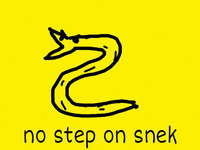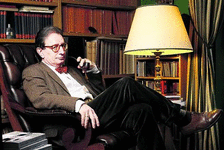|
Replies: 11
| visibility 1
|
Legend [15757]
TigerPulse: 100%
Posts: 17378
Joined: 2/1/99
|
"Of all tyrannies, a tyranny sincerely exercised for the
Jun 16, 2015, 9:49 AM
|
|
good of its victims may be the most oppressive. It would be better to live under robber barons than under omnipotent moral busybodies. The robber baron's cruelty may sometimes sleep, his cupidity may at some point be satiated; but those who torment us for our own good will torment us without end for they do so with the approval of their own conscience.”
-C.S. Lewis
My thought of the day. 
I was thinking about this quote yesterday...I read it years ago and it has stuck with me. I think this eloquently describes the mindset of many of us Conservatives with regard to the role of the government.
Anyway, just thought I'd put it out there.
|
|
|
|
 |
110%er [7013]
TigerPulse: 100%
Posts: 5128
Joined: 8/30/14
|
I initially read that as trannies.
Jun 16, 2015, 9:59 AM
|
|
Both are troubling, so it works either way.
|
|
|
|
|
 |
CU Medallion [56316]
TigerPulse: 100%
Posts: 31705
Joined: 8/27/02
|
Worst. Tyranny. Ever.
Jun 16, 2015, 10:06 AM
|
|
Wait so what about like Saddam Hussein's tyranny where he gassed people and stuff because he hated them? That seems worse than "omnipotent moral busybodies." In fact, the more I think about it the more a tyranny built on good intentions sounds preferable to a tyranny based on ambition and abject subjugation.
Of course, picking your favorite tyranny is kinda like picking your favorite sharp object to stick in your eyeball.
|
|
|
|
|
 |
All-TigerNet [13190]
TigerPulse: 98%
Posts: 19419
Joined: 9/27/04
|
The Tyranny of hot women isn't so bad
Jun 16, 2015, 10:08 AM
|
|
Small scale tyranny with excellent perks is what I feel like I live under some days.
|
|
|
|
|
 |
Oculus Spirit [79508]
TigerPulse: 100%
Posts: 63301
Joined: 10/30/05
|
Speak for yourself
Jun 16, 2015, 10:21 AM
|
|
I think I'd prefer just to have an ugly woman and be able to do what I want.
|
|
|
|
|
 |
All-TigerNet [13190]
TigerPulse: 98%
Posts: 19419
Joined: 9/27/04
|
Oh, I can do what I want 95% of the time
Jun 16, 2015, 10:25 AM
|
|
The other 5% of the time where I can't are worth it.
|
|
|
|
|
 |
All-In [28802]
TigerPulse: 100%
Posts: 58393
Joined: 11/14/03
|
One is harder to recognize, and thus harder throw off
Jun 16, 2015, 11:36 AM
[ in reply to Worst. Tyranny. Ever. ] |
|
That might be the point Lewis is making. Tyrants like Hussein are easily recognizable, so people retain their ability to discern right from wrong and some sort of opposition will always exist. But "soft tyranny" disguises itself and has more potential to pervert people's moral sense and to gain their trust. The "hard tyrant" is more physically dangerous in the short term, but perhaps less spiritually dangerous in the long term. So the hard tyrant has to be- and usually is- dealt with more immediately, but the soft tyrant's threat is more insidious and slow acting. Both are bad, but we shouldn't be surprised that, given the character of soft tyranny, people are more concerned with hard tyrants.
Tocqueville doesn't call this "tyranny," but "soft despotism:"
Thus, After having thus successively taken each member of the community in its powerful grasp and fashioned him at will, the supreme power then extends its arm over the whole community. It covers the surface of society with a network of small complicated rules, minute and uniform, through which the most original minds and the most energetic characters cannot penetrate, to rise above the crowd. The will of man is not shattered, but softened, bent, and guided; men are seldom forced by it to act, but they are constantly restrained from acting. Such a power does not destroy, but it prevents existence; it does not tyrannize, but it compresses, enervates, extinguishes, and stupefies a people, till each nation is reduced to nothing better than a flock of timid and industrious animals, of which the government is the shepherd.
I have always thought that servitude of the regular, quiet, and gentle kind which I have just described might be combined more easily than is commonly believed with some of the outward forms of freedom, and that it might even establish itself under the wing of the sovereignty of the people.
Our contemporaries are constantly excited by two conflicting passions: they want to be led, and they wish to remain free. As they cannot destroy either the one or the other of these contrary propensities, they strive to satisfy them both at once. They devise a sole, tutelary, and all-powerful form of government, but elected by the people. They combine the principle of centralization and that of popular sovereignty; this gives them a respite: they console themselves for being in tutelage by the reflection that they have chosen their own guardians. Every man allows himself to be put in leading-strings, because he sees that it is not a person or a class of persons, but the people at large who hold the end of his chain.
By this system the people shake off their state of dependence just long enough to select their master and then relapse into it again.
|
|
|
|
|
 |
All-In [28802]
TigerPulse: 100%
Posts: 58393
Joined: 11/14/03
|
More on "soft despotism" from Paul Rahe
Jun 16, 2015, 11:42 AM
|
|
(who literally wrote the book on Tocqueville's concept of "soft despotism")
http://yalepress.yale.edu/YupBooks/book.asp?isbn=9780300144925
We have contracted the "French disease." To an ever-increasing degree, our compatriots are subject to what Tocqueville described as "an immense tutelary power which takes sole charge of assuring their enjoyment and of watching over their fate."[1] As he predicted, this power is "absolute, attentive to detail, regular, provident and gentle," and it "works willingly for their happiness, it provides for their security, foresees and supplies their needs, guides them in their principal affairs, directs their industry, regulates their testaments, divides their inheritances." It is entirely proper to ask whether it can "relieve them entirely of the trouble of thinking and of the effort associated with living," for such is evidently its aim.
Moreover, "after having taken each individual in this fashion by turns, into its powerful hands, and after having kneaded him in accord with his desires":
[The sovereign] extends its arms about society as a whole. It covers its surface with a network of petty regulations--complicated, minute, and uniform--through which even the most original minds and the most vigorous souls know not how to make their way past the crowd and emerge into the light of day. It does not break wills; it softens them, bends them and directs them. Rarely does it force one to act but it constantly opposes itself to one's acting on one's own. It does not destroy, it prevents things from being born, it extinguishes, it stupefies and finally, it will reduce each nation to nothing more than a herd of timid, and industrious animals of which the government is the shepherd.
As I said, when Tocqueville wrote these words, he did not have our country in mind. He was worried--and rightly so--about his native France. Where other luminaries, such as François Guizot, looked optimistically to the rule of a technocratic elite armed with authority conferred by a liberal, quasi-democratic regime, Tocqueville anticipated something much more ominous: the establishment of a "social body" that would be intent on exercising foresight with regard to everything. It would act as a "second providence," nourishing men from birth and protecting them from "perils," and it would function as a "tutelary power" capable of rendering men "gentle" and sociable in such a manner that crimes would become rare, and virtues as well.
When under the rule of this "tutelary power," he foresaw that the human soul would enter into a "long repose." In the process, "individual energy" would be "almost extinguished," and when action was required, men would "rely on others." In effect, a peculiar brand of what Tocqueville called "egoism" initially, and "individualism" later, would reign, for everyone would "withdraw into himself." If "fanaticism" disappeared, as he suspected it would, so would "convictions" and "beliefs" and human agency itself. [This sounds an awful lot like Lewis's "men without chests" from The Abolition of Man doesn't it? So I wouldn't be surprised if Lewis was aware of Tocqueville's "soft despotism" and had something very similar in mind in the OP's quote]
The new and unprecedented "species of servitude" that Tocqueville had in mind was, as he later observed, "regulated, gentle, or soft, and favorable to peace." He suspected that it could be "combined more easily" than men were inclined to imagine "with some of the external forms of liberty." He even suggests "that it would be possible for it to be established in the very shadow of the sovereignty of the people."
In this fashion--with the institution of a "unitary, tutelary, all-powerful" government "elected by the citizens" at regular intervals--one might actually satisfy the two contradictory impulses found among his contemporaries: the felt "need for guidance and the longing to remain free." What this would involve, Tocqueville explains, is a "species of compromise between administrative despotism and the sovereignty of the people," a corrupt bargain between the ghost of Jean-Jacques Rousseau and that of his erstwhile admirer Anne-Robert-Jacques Turgot in which the political doctrine of Rousseau was deployed rhetorically for the purpose of legitimizing a law-abiding, steady, reliable despotism on the Chinese model--a model of the sort that was espoused, in full knowledge of what they were embracing, by Turgot's mentors among the Physiocrats in France.
Under such an arrangement, Tocqueville remarked, "the citizens emerge for a brief moment from dependence for the purpose of indicating their masters, and then re-enter," without further ado, "their former state" of dependence. "They console themselves for being in tutelage, with the thought that they had chosen the tutors themselves," and "they think that they have sufficiently guaranteed the liberty of the individual when they have delivered to the national power."
Message was edited by: camcgee®
|
|
|
|
|
 |
Legend [15757]
TigerPulse: 100%
Posts: 17378
Joined: 2/1/99
|
Interesting reading. Thanks.***
Jun 17, 2015, 9:27 AM
|
|
|
|
|
|
|
 |
All-In [25000]
TigerPulse: 100%
Posts: 42884
Joined: 7/31/10
|
|
|
|
|
 |
Legend [18026]
TigerPulse: 100%
Posts: 30159
Joined: 9/9/06
|
How would he view religion?
Jun 17, 2015, 2:03 PM
[ in reply to One is harder to recognize, and thus harder throw off ] |
|
Thus, After having thus successively taken each member of the community in its powerful grasp and fashioned him at will, the supreme power then extends its arm over the whole community. It covers the surface of society with a network of small complicated rules, minute and uniform, through which the most original minds and the most energetic characters cannot penetrate, to rise above the crowd. The will of man is not shattered, but softened, bent, and guided; men are seldom forced by it to act, but they are constantly restrained from acting. Such a power does not destroy, but it prevents existence; it does not tyrannize, but it compresses, enervates, extinguishes, and stupefies a people, till each nation is reduced to nothing better than a flock of timid and industrious animals, of which the government Religion is the shepherd.
-still makes sense.
|
|
|
|
|
 |
CU Guru [1147]
TigerPulse: 73%
Posts: 1671
Joined: 12/8/04
|
Re: religion - that is what i was thinking
Jun 17, 2015, 10:22 PM
|
|
as I read the original quote.
|
|
|
|
|
|
Replies: 11
| visibility 1
|
|
|



 to award
the award.
to award
the award.










